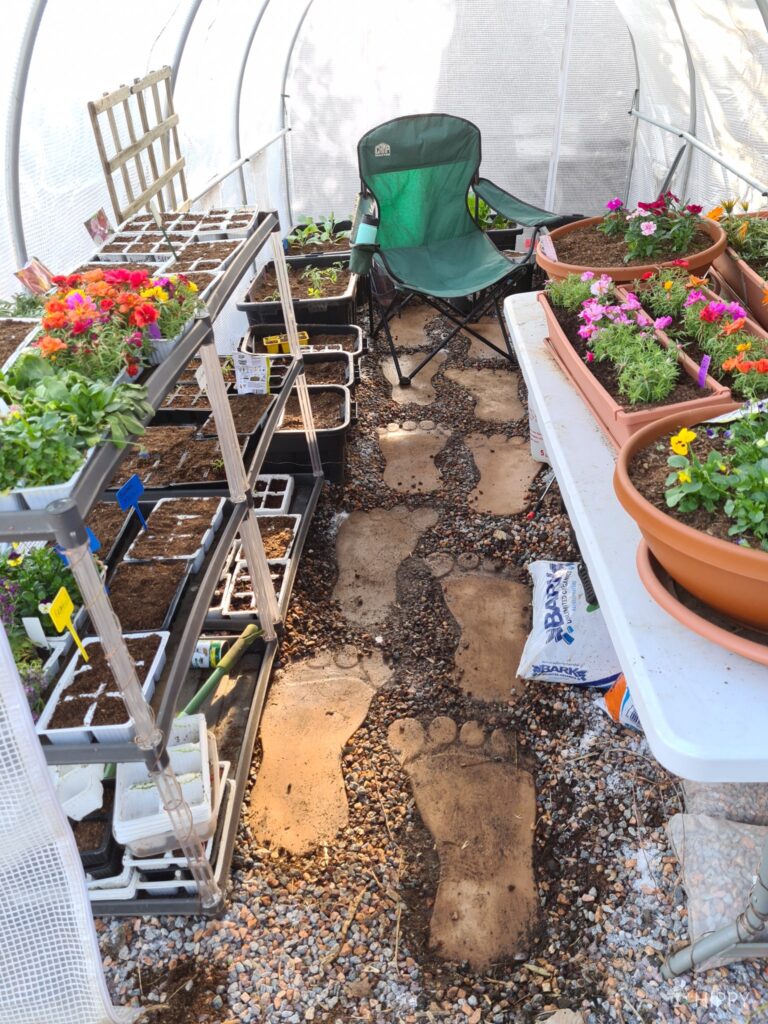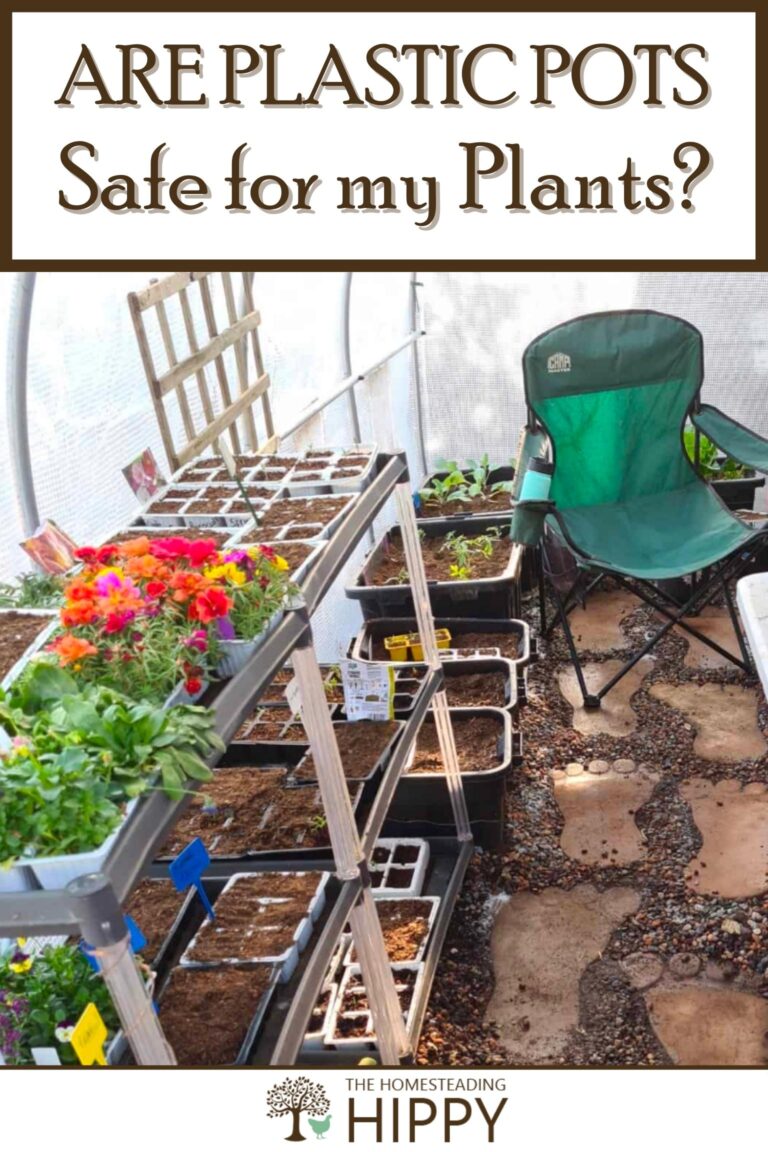Anyone who has taken the time to grow plants of any kind be they decorative ornamentals or edible produce or herbs knows that it is an easy thing to lose a plant you’ve worked hard on for seemingly innocuous reasons.

Something like PH imbalance, soil contamination, or parasites is enough to do the trick. Some growers even worry that chemicals leached from plastic pots could harm their plants.
So, are plastic pots safe for plants?
Yes, plastic pots are completely safe for plants. Concerns over chemicals leaching out of plastic resulting from consistent exposure to water or intense UV light are offset by the soil in the pot and the fact that most such harmful molecules are too large to be absorbed by the roots of a plant.
If in doubt growers are advised to purchase pots that are BPA-free, or use old-fashioned terracotta pots.
As it turns out you don’t have much to worry about if your plants are purchased or grown in those usual, black plastic pots or any other kind of plastic container.
However, it is in your best interest to know what you should and should not do if you’re growing plants in a plastic container. Keep reading to find out more.
What are the Benefits of Plastic Pots?
Even though plastic is getting a lot of bad press lately, this material still has much to recommend it. Plastic pots offer a number of benefits to both the grower and the plant.
Plastic pots are generally very cheap compared to other materials such as ceramic or terracotta.
This makes them ideal for those who are just starting out in their gardening journey or for those who simply want to experiment or use utility containers without breaking the bank.
Plastic pots are also much lighter than other common container materials, making them easier to move around when necessary.
This can be especially useful if you have a lot of plants or if your plants are large. A large plant plus a load of soil can weigh dozens of pounds, before the weight of the container!
Plastic is also a very durable material that can withstand a fair amount of wear and tear.
This means that your plastic pots are less likely to break if you accidentally drop them or if they are knocked over by a gust of wind, and they degrade slowly when in the elements.
Plastic also happens to be very low maintenance. Unlike other materials such as wood, they don’t require any special care, finishing, or other treatment and can simply be wiped down with a damp cloth if they get filthy.
There is a lot to like about plastic, so don’t be too quick to toss them!
Shortcomings of Plastic Pots
However, it isn’t all good news about plastic. One of the main complaints about plastic is that it can get very hot in direct sunlight. Plastic is a pretty good insulator!
This can cause problems for roots that are sensitive to high temperatures, leading to heat stress or even root death.
If you live in an area with very hot summers, it’s best to choose a lighter-colored plastic pot or one with a UV-resistant coating to help mitigate this issue.
Another downside to plastic is that it is not as breathable as other materials such as terracotta or ceramic.
This means that water can sit on the surfaces of the pot for longer, leading to potential issues with overwatering or waterlogged soil.
Be sure to choose a pot with good drainage holes and always allow the soil to dry out somewhat between watering to avoid any problems.
Lastly, there is a small but non-zero chance that some plastic pots could indeed leach chemicals into your soil, and some say even into the plant itself.
The vast majority of plastic pots on the market are made from polypropylene or high-density polyethylene, both of which are declared to be “very safe” by the Powers that Be.
However, if you are concerned about this issue you are advised to seek out specialty plastics that won’t release these potentially harmful chemicals. More on that in a minute.
Is Chemical Leaching Really an Issue?
Honestly, it almost certainly isn’t, for a few reasons. First, the concentrations of these chemicals are going to be vanishingly small.
Second, plants are very good at taking up and metabolizing nutrients, but they’re not very efficient at the uptake of non-nutrients.
Third, most of these chemicals have a very low toxicity threshold anyway, so it would take a ton of them to actually cause any problems if ingested, either by the plant directly or by you if you eat the plant.
Nonetheless, the mere notion wigs some people out, and if you’d rather be safe than sorry keep reading for some helpful tips to mitigate this minuscule but scary concern.
Possible Considerations for Using Plastic Pots
If you want to rely on plastic pots for your plants, in any capacity, keep these helpful tips in mind.
When possible, pick a light-colored plastic pot or one that’s been UV-resistant treated. This will help mitigate issues with them trapping heat, and also make them more comfortable to handle.
If possible, keep them out of the intense, full sun. This will help to minimize the chances of chemical breakdown, too.
Make it a point to drill your own drainage holes to suit. Sadly most plastic pots and other containers have poorly sized, situated, and placed drainage holes.
This will often trap water where you don’t want it, and since water is a universal solvent it could contribute to the release of chemicals from the plastic over time.
Lastly, make it a point to inspect your soil between waterings so you really know what’s going on.
Plastic has a tendency to keep the soil within moister for longer, and that might be an issue so you should adjust your watering schedule accordingly.
Letting the soil get too dry isn’t ideal, but keeping it soggy will encourage problems like root rot which can quickly kill your plants.
Should You Remove Your Plants from Plastic Pots?
It is usually not necessary, at least until such time your plants need to be repotted anyway. If you’re really concerned about the possibility of chemicals leaching into your plants from their plastic pots, you can always transplant them into something else.
This is really only necessary if you’re using very old or damaged plastic pots that might be more prone to breakdown, however.
In most cases, it’s really not worth the hassle and potential damage to your plants to worry about this issue.
Just be sure to use good quality pots, refrain from putting them in the intense sun all the time, and make sure the drainage holes are adequate. Other than that, it’s probably not worth losing any sleep over.
Consider BPA-free Plastic Containers for Extra Assurance
If you are really worried about chemical leaching, consider tracking down planters that are made with BPA-free plastic. BPA, or bisphenol A, is something of the chief boogeyman when it comes to concerns about plastic in the food chain.
It is a synthetic compound that is used in the manufacture of certain plastics. Although it has been linked to a variety of health concerns, the evidence is far from conclusive though opponents make a good case against it.
Some studies have suggested that BPA can leach out of plastic containers and into food or drinks, where it may then be absorbed by the body.
There is also some evidence that BPA can interfere with the body’s endocrine system, although the exact mechanism is not yet understood.
Despite these potential risks, BPA is still widely used in all kinds of plastics and as a result, it can be found in a wide variety of consumer products, from water bottles to food storage containers and, yes, pots.
If that worries you, but you don’t want to give up the benefits of plastic, seek out replacement pots made with BPA-free plastic, or check the container itself before buying a potted plant; it could be marked.

Tom has built and remodeled homes, generated his own electricity, grown his own food and more, all in quest of remaining as independent of society as possible. Now he shares his experiences and hard-earned lessons with readers around the country.
Find out more about the team here.
